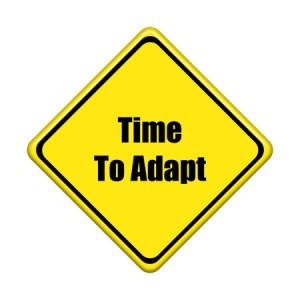What Does Adaptability Really Mean In Business?
 All organizations must navigate through a sea of uncertainties and unexpected issues. A common assumption is that effective planning is the best way to cope through turbulent times. But even the best-laid plans can be useless when the landscape changes suddenly or too quickly.
All organizations must navigate through a sea of uncertainties and unexpected issues. A common assumption is that effective planning is the best way to cope through turbulent times. But even the best-laid plans can be useless when the landscape changes suddenly or too quickly.
This leads to the common saying: “adapt or die”.
Organizations that have built adaptability into their DNA are often better at responding to unfamiliar territory. They understand its benefits and experience long-term sustainability.
So what exactly does it means to be adaptive?
Some call it being agile. But it is more than moving quickly.
Others label it being flexible. But it’s more than just being open to change.
As a differentiating value, Adaptability means ability to change and maintain effectiveness in a changing environment.
The critical ingredient to adaptability is remaining effective when everything is changing.
So how do companies remain effective in times of change?
This is the mystery many leaders seek to uncover. Maybe there are some clues in how various companies define this value.
Unpacking Adaptability
Surprisingly, many companies that claim adaptability – or agility – as a core value do not provide any explanation. They assume everyone knows what it means.
From those that do provide some explanation of this value, they range from simple to quite detailed.
Here are a few simple definitions:
EMC – Stay flexible; adapt as circumstances change.
Grainger – Challenge the status quo and be open to new ideas.
AMD – Continuously learn and improve in all aspects of our business.
A few more with broader definitions:
SanDisk – We question the status quo and move quickly and decisively to capitalize on opportunities.
AECOM – We move with speed and dexterity to adapt and adjust to emerging client and project requirements.
These definitions suggest questioning the status quo and continuous learning are important ingredients to being adaptive. Is there more?
One company with a rather detailed definition is Domtar. They refer to this value as being agile.
It’s in our fiber to be agile. Our industry is constantly changing. And we will be the ones leading the way. When we need to change course, we do it. We are doers, not talkers. But when we act, we act thoughtfully. We have the power to make decisions for the benefit of our company and our customers. We’re always looking for simpler, more efficient ways to work.
Domtar includes two important ingredients in order to maintain effectiveness in a changing environment: leadership and taking action.
So organizations that embrace adaptability as a differentiating value are also industry leaders that take action. And their people are continuously learning and questioning the status quo.
In other words, adaptability is not a value for reactive organizations. This is a value best suited for proactive organizations that are leading the change in their industry.
Is there a company you know of that demonstrates the real value of adaptability?
Today’s value was selected from the “Diversity-Flexibility” category, based on the e-book Developing Your Differentiating Value.







